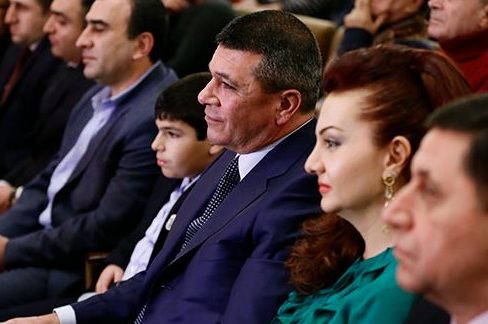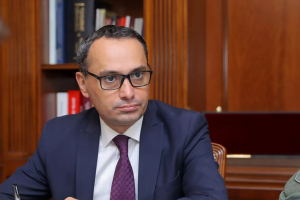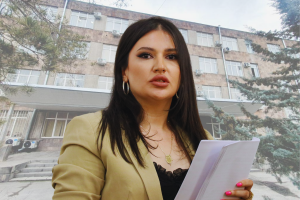Today, on October 17, the examination of the case of former Police Chief Vladimir Gasparyan continued in the Anti-Corruption Criminal Court, presided over by Judge Suren Khachatryan.
The indictment states that Gasparyan, knowing that Susanna Sardaryan (Gasparyan), who was in a de facto marital relationship with him, did not report to the Ministry of Defense Military Police service and never performed official duties arising from her position, paid her a salary.
The state suffered particularly large-scale damage of 17 million 275 thousand 721 drams.
According to Iravaban.net, three summoned witnesses appeared at this court session: Alina Galoyan, Armen Sultanyan, and Arshavir Baklachyan.
Witness Alina Galoyan was interrogated first. The witness stated that she knows the defendant Vladimir Gasparyan, they worked together in the Military Police for many years.
During the interrogation by the preliminary investigation body, she stated that she did not know Gasparyan’s wife, Susanna Gasparyan, had not seen her.
To the question of the public prosecutor, prosecutor Armen Muradyan, about when she started working in the Military Police, the witness said: from 2002, in the AWOL (Department for Detection of Servicemen Who Left the Military Unit Unauthorized) department, as an inspector of the analytical group.
- Can you tell who led the subdivision and which employees do you remember?
- Mr. Baklachyan led it, and among the employees, for example, we are still working with Anahit Harutyunyan, she was in our department at that time, Armen Sultanyan worked among the guys, Mushegh Melkonyan worked, there were many.
- And how many employees were there?
- About 12, if not more.
- What were the functions of the department?
- We carried out search operations for servicemen who left the military unit unauthorized, I specifically kept records, worked with lists, then prepared reports.
- Where did you conduct your work activities?
- In the current Military Police, it has two buildings, always at the same address.
To the prosecutor’s question about whether absences from work were prolonged or not, the witness said no. The next question was about work relations with Vladimir Gasparyan, to which the witness noted the following: “Well, how can it be between the boss and the lowest-ranking employee, there was almost no communication, only if we met in the area or if Mr. Gasparyan visited the department for some function, I had no obligation to present any document or directly interact with him by virtue of my position.”
To the question of whether there were people among the employees who did not go to work for a long time, the witness said there was no such case in their department. To another question about whether there were cases when certain individuals were registered but assigned to another subdivision, the witness answered that such things happened, she didn’t know names, but she knew of people who were on the staff of another department but worked with her.
“There was a line-up inspection, where they wrote on the sheets the number of people on vacation, absent without excuse, assigned.”
- Do you know Susanna Sardaryan?
- I didn’t know her, but later I learned that she… I learned later, when I was called here for testimony, I didn’t work with her, didn’t see her, didn’t know her, but later I learned that she…
- What did you learn?
- That she was in the analytical group, but I didn’t know.
- Have you ever seen her come to work, you mentioned line-up inspections or line-up
Vladimir Gasparyan’s defender, advocate Erik Aleksanyan objected to the last question, noting that the witness had already stated that she doesn’t know Susanna Sardaryan, and therefore couldn’t have seen her.
- Let me rephrase my question. Has there ever been an unfamiliar woman standing with you during inspections or when you stood with your department?
- I don’t remember such a case.
- If your department was standing with an unfamiliar person, would that circumstance impress itself upon you?
- That’s such a long time ago that I can remember if such a thing happened.
- If there was an inspection at your workplace today, and they said the whole department should be standing, your department stands, and for example, there are 10 people in the department, but 17 people come and stand, would that circumstance impress itself upon you or not?
Vladimir Gasparyan’s defender objected again, saying that the question should be objective, making judgments about impressions is not appropriate. The prosecutor insisted that the whole problem is to understand what perceptions and understandings the witness had about certain circumstances.
- I said you don’t know her, have you ever heard that she worked, did you have any information about her?
Aleksanyan said the following about this question: “She doesn’t know, has never seen, logic suggests she has no information about her, the person has specifically said several times: how many times do we need to get an answer to this question?”
The prosecutor continued the question, trying to clarify if there was a case when Susanna Sardaryan herself was assigned to this subdivision, the witness said she had no such data about any individual.
- During the preliminary investigation, when you gave testimony, was there any influence on you or not?
- No.
- Did you tell what was true?
- Yes.
Public prosecutor, prosecutor Arsen Gevorgyan asked the witness if there are specific employee data who were assigned during the same period of joint work in that department. The witness answered that she doesn’t remember names clearly: “It seems Tigran Chakhmakhchyan was, he was by order somewhere else, but with us, and there were other cases, he wasn’t the only one.”
- Do you specifically remember who of these persons were assigned, and under these conditions, were they assigned by verbal order or written?
- Tigran Chakhmakhchyan’s was by order, he was in another department, but he was with us, then he went to his department.
- Were there persons from your department assigned to other subdivisions during your work period?
- I don’t know because I didn’t deal with those orders.
Next, Erik Aleksanyan directed questions to the witness, inquiring whether employees signed under some list when receiving salary or not, and whether Susanna Sardaryan’s name, surname was in that list, to which the witness said they signed, but she didn’t look at the names of other employees on the list.
To the question of whether she had ever heard that Vladimir Gasparyan’s wife worked in the Military Police, the witness said that due to her nature, throughout her service and even now, she communicates with very few people, she wasn’t interested.
Prosecutor Armen Muradyan again addressed the issue of the department head taking measures in case of an employee’s absence, asked if the absent person was Vladimir Gasparyan’s wife, would the head take the same measures as in the case of other employees, the witness said in her opinion there would be some subjectivity in that regard.
To the presiding judge’s question of whether the head would present a report to Vladimir Gasparyan that his family member is not coming to work, the witness answered that in her opinion no, he would probably talk or give some instruction.
After the witness interrogation, prosecutor Armen Muradyan came forward with a motion to publish the witness’s preliminary investigation testimony, considering that there are contradictions between the answers to questions about assignments.
According to the preliminary investigation testimony, the witness stated that she is not aware of any case where someone from their department did not report to work for a long time without valid reasons, she has not heard that anyone from the department was assigned to another subdivision, such data are not known to her. The witness insisted that she had not seen the assignment orders, she only knew about it during the line-ups, she did not remember these details in the preliminary investigation body.
The interrogation of the first witness ended, next witness Armen Sultanyan was interrogated.
He stated that he knows Vladimir Gasparyan, he was in a working relationship with him. Regarding Susanna Sardaryan, he stated that she was an employee of the institution:
“I worked in the AWOL department as an inspector, we didn’t have communication, we saw each other a few times in the administrative building. I worked from 1997 to 2009, Harut, Mushegh, Tigran, the other Tigran, Ashot, Alina Galoyan worked with me. In total, we were 12 or 13 people.”
To the public prosecutor’s question about what function they performed, the witness said they were working towards detecting servicemen who left the military unit unauthorized. The witness stated that the working hours started from 9 am until 18:00, they worked at the addresses given by Alina Galoyan, trying to detect servicemen who left the military unit.
- Were there employees in your department who didn’t report for service for a long time?
- No.
- How did you know Susanna Sardaryan, and as whom did you know her?
- I knew her by face, I didn’t know her closely, I met her in the administrative building, in the cafeteria, in the personnel department, in the headquarters.
- Was the latter an employee of your department or not?
- I can’t say whether she was an employee of our department or not.
- How were assignments carried out in the Military Police?
- In our department, honestly, I don’t know how it was.
- Do you know a person who was registered in your department but assigned to another subdivision?
- I was too small a person to know such a thing.
Vladimir Gasparyan’s defender, advocate Erik Aleksanyan asked if in the case when an employee was registered and didn’t show up for work, would Baklachyan report about it to the chief or not, the witness said he can’t guarantee on his behalf.
The witness also stated that he had seen Susanna Sardaryan in uniform at the workplace from time to time, he wasn’t interested if her name was on the salary list or not. To the presiding judge’s question about how he knew about Susanna Gasparyan, the witness said the employees said that she was a “person standing close to the department head.”
Prosecutor Armen Muradyan motioned to publish a part of the witness’s preliminary investigation testimony under the conditions of existing contradictions. The court satisfied the presented motion.
In particular, while giving testimony, the witness noted that he didn’t know any of Vladimir Gasparyan’s family members, didn’t work with them. Regarding Susanna Gasparyan’s work in the Military Police, the witness stated that he has no information about it at all, he absolutely didn’t know her.
Under these contradictions, the witness insisted that although he had seen the latter in the administrative building, he didn’t know such an employee in their department.
- The question is clear, it’s about Susanna from your department, a question is formulated, have you seen her in the Military Police or not, you say I haven’t seen, they ask do you know a person named Susanna Sardaryan or not, you say I don’t know, I don’t know who it’s about, now you say yes, I know, I know she was one of Vladimir Gasparyan’s close people, moreover, she was in uniform, moreover, she couldn’t, she had to enter with a pass. There’s such a difference in your answers, and it doesn’t refer to events from 18 years ago, you said one thing to the investigator, now you’re saying something else.
- I didn’t remember then, I remembered later.
- What did you remember later?
- That later there was such an employee.
- What made you remember?
- From the previous trial, which was also here in the other hall.
- In the other hall, you remembered that you didn’t know Vladimir Gasparyan’s, your leader’s close person, and you forgot about her, is that your answer?
- Uh-huh.
- What’s uh-huh, you’re not in a pavilion.
The witness interrogation ended, next Arshavir Baklachyan was interrogated. He stated that he currently works in the Arabkir administrative district as the head of staff. He was in a working relationship with Vladimir Gasparyan.
He was the head of the AWOL department, Susanna Gasparyan was included in his department as an operative worker: “I have answered the questions, Susanna Gasparyan, it’s true, where my department was located, she didn’t have a place to sit there, but she had it in the adjacent building, which was 20 m away from us. She performed the work that Mr. Gasparyan put before me. We worked together. With serious crimes, Susanna Gasparyan, since she knew Russian, together with me, we tried to get the criminal out of where he was through phone calls.”
He noted that besides these functions, he also received guests visiting from the Russian Federation with Susanna Gasparyan, including Russian Defense Minister Pavel Grachev.
The prosecutor asked the following questions:
- How were the discussions with you, you were the leader, did you go to report these operative things to her, or did she come?
- I went, I didn’t feel bad that I was going.
- Did you also go to other employees?
- Other employees, yes, I went, because it was arranged completely differently for us, it was arranged in a new style, I could see all the employees from the window, they were sitting, I went, put the task, came back, if needed, I called them to me.
- I go to my superiors for briefing, was it different in your case, did you go to your employees, report?
- But I didn’t go for briefing, I went to set the task.
The witness said about this question that he called, if the latter was on site, he went to her and never felt bad about it. Regarding other employees, he noted that if he needed to give a separate instruction to one of the employees, they came to him. The prosecutor asked again:
- In Susanna Gasparyan’s case, did the latter come to you for briefing or not?
- No, Susanna Gasparyan didn’t come.
- What was the reason?
- I don’t know what the reason was, the reason was probably that Susanna Gasparyan was Vladimir Sergeyich’s wife.
To the question of whether they knew in the collective that there was any employee who worked in another administrative building, the witness said why should he tell the employees that the given employee is doing the operative work that the others should not know about: “I found that my employees shouldn’t have known Susanna Gasparyan, because we had an operative service that the Military Police staff didn’t know about at all, I also cooperated with that department, that’s why we had such good results from 1997 until the end,” said the witness.
He noted that to find a serviceman who left the military unit, Susanna Gasparyan would call the corresponding address, speak in Russian, and during that time they were engaged in the action of detecting the serviceman who had escaped from the military unit.
Prosecutor Armen Muradyan motioned to publish the witness’s preliminary investigation testimony, and despite the defense’s objection, the court satisfied the presented motion.
During the preliminary investigation, the witness stated that Susanna Gasparyan dealt with ceremonial issues, reception of various delegations visiting the Ministry of Defense, organization of events. He noted that the latter was decreed in the department, but did not report to work there, did not have an office.
The interrogation of the third witness ended. The next court session in this case will take place on November 13.

















